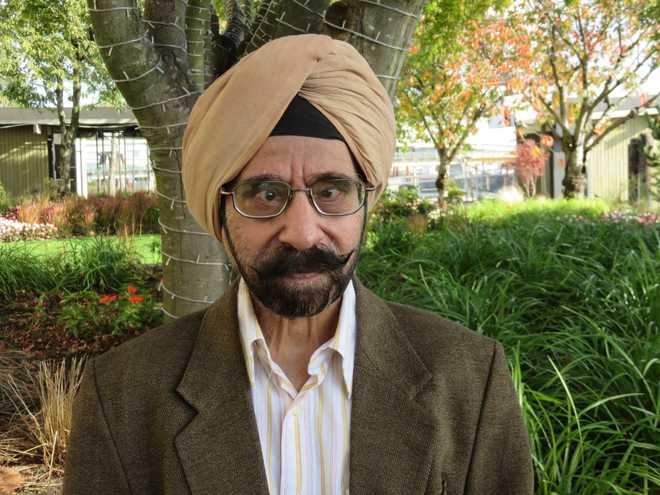
Darshan Singh
Jaspal Singh
The Punjabis are a highly politicised community, though this fact is not reflected in their literature. A well-known Punjabi novelist, Darshan Singh from Delhi, who died recently at the ripe old age of 88, was a rare exception. He wrote 12 novels in all, four of them political novels.
Darshan Singh worked in the Soviet Embassy, New Delhi, for many years. He also had worked as a translator in Moscow. Darshan Singh started writing at the mature age of seventy and was immediately recognised as a major literary voice. He was awarded the $25,000-Dhahan prize for his literary achievements. His four political novels are Bhau (The Elder Brother), Galary Shahidan (The Gallery of Martyrs), Lota (The Spouted Vessel) and the latest Chakkarvyuh (The Puzzling Array of Forces).
His novel Bhau, a best-seller of sorts, was based on the role played by Harkishan Singh Surjeet during the 2004 General Elections for bringing together the Congress and various regional political parties to defeat the Bharatiya Janata Party. Readers would remember that the over-ebullient BJP had preponed the polls by a few months in 2004 because of their 'India Shining' and 'Bharat Uday' impact. The overconfident BJP leaders assumed that the poll results were already in their favour. But the people of India 'betrayed' them.
Chakkarvyuh, published by Lokgeet Parkashan, Mohali, revolves around the Shah Family — the ruling clan in the largest state of India named Vishalanchal. How the family, misusing its political clout, makes piles of money and stashes it away in the overseas safe havens, is meticulous in detail. The patron of the family, who was the Chief Minister, dies of a heart attack. His young son Gautam wants to replace him. But the party High Command in Delhi appoints Param Kirpal as the Chief Minister. Gautam has a fight with the senior leaders of the High Command on the issue. Miffed by his attitude, they institute a vigilance inquiry against the family for amassing disproportionate assets. Gautam is arrested and is sent to prison. As the inquiry continues, more corruption cases are filed against him. Eventually, the family retaliates and its members go on a pad yatra in the state where more them one fourth of the voters are from their caste. The yatra is hugely successful. The agitated people sympathise with and support the Shah Family. The High Command is terrified. If it does not make up with the Shah Family, it would be wiped out in the largest state. The novel also highlights the role of media. How election surveys are conducted and relayed on the television channels and how the press is manipulated.
The High Command sends an emissary to negotiate a deal with the Shah Family who harden their stand, sensing the nervousness of the High Command. They want Gautam to be made the Chief Minister and all the cases to be withdrawn forthwith. Forced by circumstances the High Command agrees to make Gautam the Chief Minister. In due course he dilutes cases against him to get out of the chakkarvyuh laid out against him by the High Command to tame him.
This novel is a comment on real-life politics played by different political parties in India. Unethical bargaining, electoral malpractices, caste and communal manipulations, ubiquitous corruption at all levels of the system, role of muscle and money power in politics, how the bureaucracy and the judicial system are rigged by the powers that be, immoral compromises and chicanery practiced by the political class, every aberration that India's political system has suffers from since decades, is stripped bare.
Many years ago Shrilal Shukla wrote a classic novel Raag Darbari in Hindi on a similar theme. Raag Darbari tells the story of an imaginary village Shivpal Ganj which is presented as the microcosm of a nation that has gone astray from its original ideals. Darshan Singh who lived in Delhi for most of his life, upgraded Shukla's theme in his own way. Being a keen observer and having friends in many political parties, he could understand the genetic abnormalities created by the political muck spread all over the place. When our country is passing through an acute crisis in political morality, more such commentaries in the fiction form are required. Literature, after all, is a social institution and it has a great role to play in social rectitude in addition to providing aesthetic gratification. That is why the 17th century writer John Dryden, the father of English criticism, has stated that the functions of poesy (literary creations) are 'instruction' and 'delight'. No doubt, the later literary thinkers have added something more to these concepts.



























